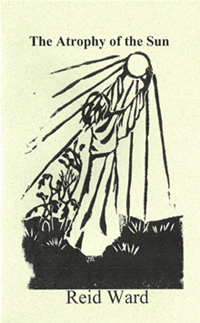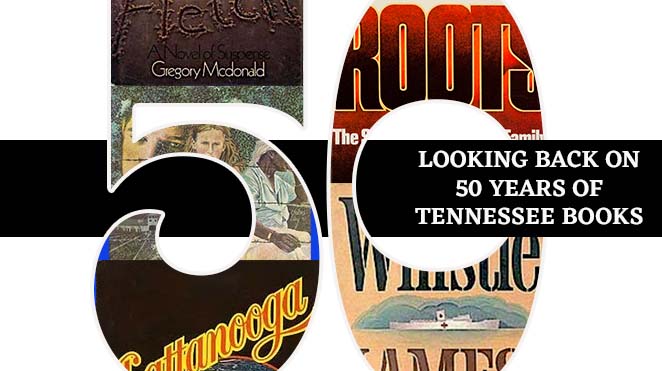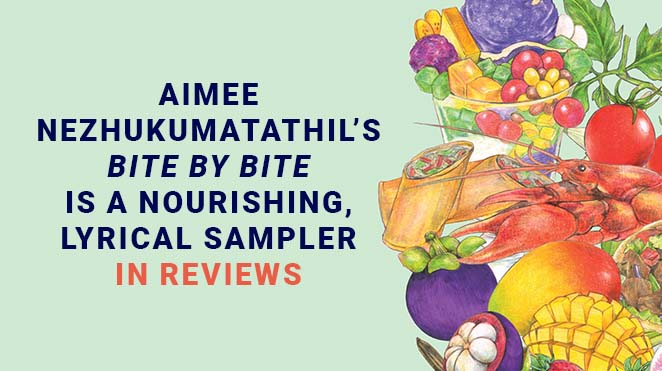Reid Ward is a preacher’s kid, and like of lot of so-called “PK”s he’s a natural-born insurgent. During high school, Ward was bright and likeable but was more committed to partying than to studying. More than anything, he hated English—“I don’t remember ever reading a book all the way through until after high school,” he says. It’s perhaps ironic, then, that Ward’s first poetry chapbook, The Atrophy of the Sun, has just been published by Pudding House. The collection showcases the depth of Ward’s compassion, his spiritual awareness, and his remarkable use of imagery. Most of all it shows that, though he may have grown up, Reid Ward hasn’t lost his rebellious streak.
Though born and raised in the South—he spent his childhood in Nashville and moved with his family to Sewanee while in high school—Ward isn’t a writer of place. The angels and demons that inhabit his work—the physical and spiritual masks we wear, the transcendence and immanence of God, and the sometimes ephemeral nature of relationships—could be the subjects of writers anywhere. Take, for example, the second half of “Paradigm,” a poem that evokes both euphoria and despair:
…To me it feels
Like I’m 16, high as hell, and watching
My friend push the gas past 70 on a hick
Town back road. We fly up a hill then quickly down
And feel our stomachs disassociate,
Wanting to wretch and sing at the same time.
“Want to do it again?” “Hell yeah.”
But that’s not really how it feels because then
I had someone to point to if something went wrong;
Now my scapegoat is my Self. And while the world evolves,
I feel like a mime whose gloved white hands
Palm a coffin that is everywhere and nowhere;
A cage designed by God, or maybe his shadow.
Ward knows about life in a coffin. When he was eighteen and a senior in high school, he fell from the roof of his house in an alcohol- and weed-induced haze. He broke both arms, smashed his head, and broke his neck. When he woke from a month-long morphine dream, he prayed for death. “Have you ever seen The Diving Bell and the Butterfly?” he asked in a recent interview. “The only way I could communicate was by blinking my eyes. I literally thought I was dead and in hell. It was horrifying.” Though Ward has recovered the ability to speak and has regained some use of his arms, he remains paralyzed from the chest down.
 After the accident Ward says he faced a choice: to make something of his life or to die—either the immediate kind or a metaphorical suicide through television, drugs, etc. He chose the former, and through sheer force of will—and some prodding from his parents—managed to graduate with his high-school class at St. Andrews Sewanee and enroll at the University of the South. There he discovered a lifeline in poetry and fiction.
After the accident Ward says he faced a choice: to make something of his life or to die—either the immediate kind or a metaphorical suicide through television, drugs, etc. He chose the former, and through sheer force of will—and some prodding from his parents—managed to graduate with his high-school class at St. Andrews Sewanee and enroll at the University of the South. There he discovered a lifeline in poetry and fiction.
Even in a wheelchair, Ward’s presence is impressive. At approximately six-and-a-half-feet tall, his voice resonates with the authority of one who has survived more than any thirty-one-year-old should. “Writing gave me a means whereby I could creatively make sense of my pain in a way that I could share it with others,” he says. “At the same time hopefully [they can] find inroads into their own pain. We’re so into this Hi, how are you?’—I’m fine type attitude. Nobody’s fine. We’re all screaming our asses off on the inside.”
After graduating from Sewanee in 2004, Ward was accepted at Peabody and came under the mentorship of poet Bill Brown. “I find his voice fresh and honest, and he handles form in a sophisticated way,” says Brown, who’s the author of seven collections of poetry and co-author of Important Words, a writing textbook. “His rhymes are not sing-songy. He uses a lot of slant-rhymes instead of exact rhymes, and that is a very contemporary way of using form as a way of unifying and getting your message across.” Brown and Ward frequently meet for coffee. “He has a wonderful sense of humor and a sharp biting wit about his own condition,” Brown says. “Pity is not what he’s after.”
If Ward sometimes breaks the rules of academic poetry, he’s also not shy about confounding the expectations that others have of those who, like him, manage life from a wheelchair. In “My Private Special Olympics,” for instance, Ward reveals how exhausting it is to search for a silver lining.
What good is a prison without a sentence?
Why spank a child and leave the crime unnamed?
Why pull the legs off a spider one by one?
And if this constant aching is no penance,
If I’m being flogged and shouldn’t feel ashamed,
If my legs are gone for tutelage, I’m done.
“If I’m in this situation to learn, then I’m done learning,” Ward says. “I’ve learned all I can from living in a cage; I’ve learned all I can from being in pain. But that leads to the third part [of the poem], which is No, I don’t give up. I do feel guilt about having made the choices I made in order to get up on that roof in the first place, but I think it’s important to not lose that sense of guilt and responsibility for how we fail in our life and our responsibility for making life better. Plus, nobody wants to be around a cranky guy in a wheelchair.”
 That kind of truth and immediacy attracted Atrophy of the Sun’s editor, Janet Patterson Karns, to the project. A neighbor and longtime friend of Ward’s, Karns is impressed by the intelligence, depth of emotion, and artistic power of the collection. “They are the kind [of poems] that impact you immediately while inviting you into deep reflection,” she says. “They are by turns aching with tender beauty and honesty, and startling as they slam into you and leave you catching your breath.”
That kind of truth and immediacy attracted Atrophy of the Sun’s editor, Janet Patterson Karns, to the project. A neighbor and longtime friend of Ward’s, Karns is impressed by the intelligence, depth of emotion, and artistic power of the collection. “They are the kind [of poems] that impact you immediately while inviting you into deep reflection,” she says. “They are by turns aching with tender beauty and honesty, and startling as they slam into you and leave you catching your breath.”
Despite the limitations imposed on him (he writes through memorization and voice recognition software), Ward’s output is prodigious. In addition to a backlog of poems, he’s currently working on a memoir titled The Broken Axletree. Ward has also taught high school (at Harpeth Hall) and worked as a rehab counselor (at Cumberland Heights) of teens, who, like himself, have been known to push back against authority. That’s in addition to the poetry and the memoir, of course. “He doesn’t realize how much talent he has,” says Brown.
Reid Ward reads from his new poetry collection at Davis-Kidd Booksellers in Nashville on October 19 at 7 p.m. Atrophy of the Sun can be ordered by emailing atrophyofthesun@gmail.com, and all proceeds will benefit the Magdalene Community’s Thistle Farms.
Tagged: Poetry





